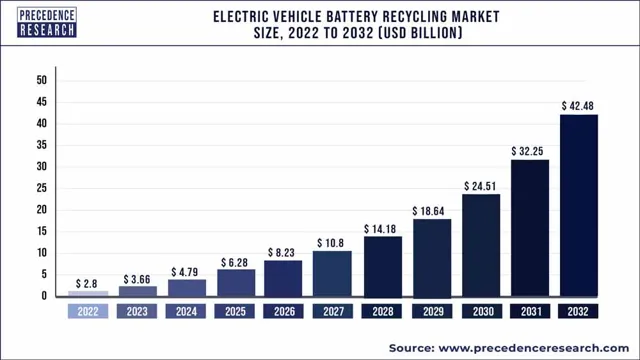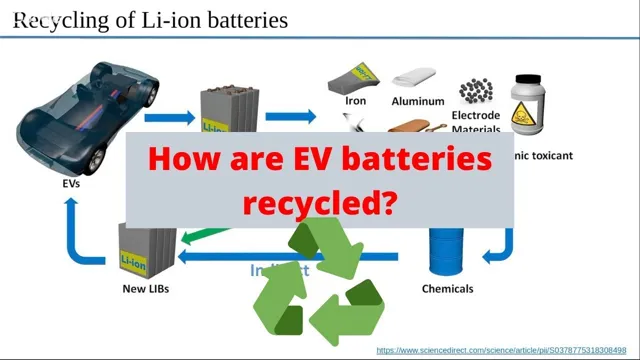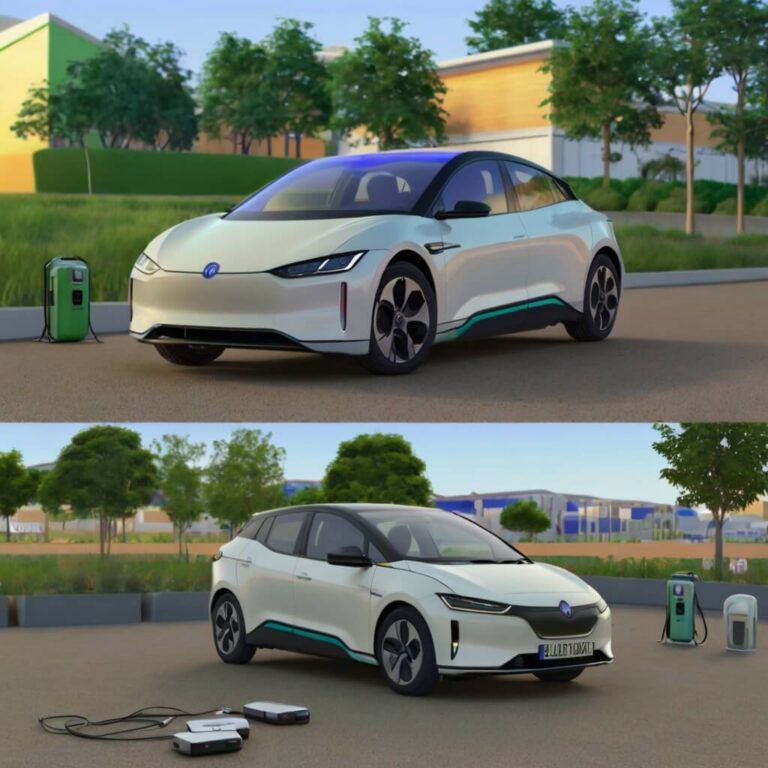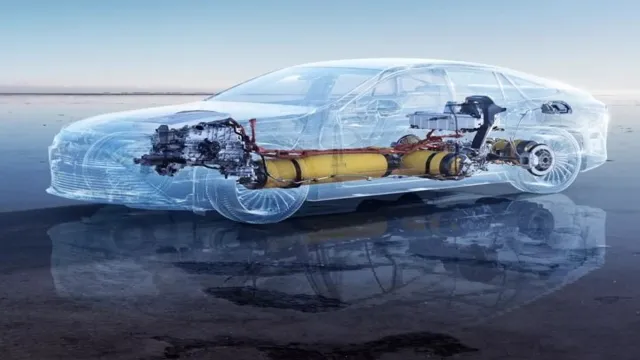The Shocking Truth: Exploring the Real Cost of Recycling Electric Car Batteries
If you’re considering adopting an electric vehicle, you’re right to consider the impact that the car’s battery will have on the environment. While creating electric cars has been touted as a green alternative to traditional gasoline vehicles, there is one important factor to consider: the cost of recycling electric car batteries. As electric vehicles become more popular, concerns are mounting about the environmental impact of disposing of these batteries, which contain toxic chemicals that can leak into the ground and water if not handled properly.
In this blog post, we’ll explore the cost of recycling electric car batteries and what that means for the environment and your wallet.
Why It’s Important to Recycle Batteries
As electric vehicles become more prevalent, the cost of recycling their batteries has become an important topic to consider. Not only do these batteries contain precious metals and other materials that can be reused, but failing to dispose of them properly can pose a serious environmental risk. By recycling these batteries, we can recover valuable resources and reduce our reliance on mining new materials.
Furthermore, recycling batteries can reduce the amount of greenhouse gas emissions produced during manufacturing, which can help mitigate some of the environmental impacts associated with electric vehicles. Despite the cost of recycling electric car batteries, the long-term benefits make it a worthwhile investment in our environment and future.
Environmental Impact
Recycling batteries is important in reducing the negative impacts on the environment. Batteries contain heavy metals such as lead, mercury, and cadmium that are harmful to the environment and human health when not disposed of appropriately. When they are thrown in landfills, these dangerous heavy metals can seep into the ground, pollute water sources, and potentially harm the wildlife ecosystem.
Recycling batteries helps in reusing these heavy metals, conserving natural resources, and reducing the demand for virgin materials, which can lead to more mining and deforestation. It’s essential to recycle batteries since using recycling facilities helps to minimize the environmental footprint of battery disposal. Therefore, by recycling batteries, you help preserve the planet’s environment, reduce pollution, and ensure the sustainability of essential natural resources for future generations.

Financial Benefits
When it comes to recycling batteries, not only is it important for the environment, but it can also have financial benefits. Disposing of batteries in the trash can lead to hazardous waste polluting our air, soil, and water. By recycling, we can prevent this and reduce the need for mining new materials to create new batteries.
Additionally, recycling batteries can provide valuable resources like precious metals that can be sold and used in other products. Not to mention, many retailers offer incentives for customers who bring in their used batteries for recycling, such as discounts or gift cards. So not only are we helping the environment, but we can also save some money in the process.
Overall, recycling batteries is a win-win situation for our wallets and the planet.
Factors That Affect Battery Recycling Costs
When it comes to the cost of recycling electric car batteries, there are several factors that come into play. One major factor is the type of battery used in the vehicle. Lithium-ion batteries, which are commonly used in electric cars, are more expensive to recycle because they require specialized equipment and processes.
Additionally, the size and weight of the battery can also impact the cost of recycling. The larger and heavier the battery, the more difficult and expensive it is to recycle. Another factor is the state of the battery itself.
If the battery is damaged or degraded, it may require more extensive recycling processes, which can drive up costs. Finally, the location and availability of recycling facilities can also impact the cost of battery recycling. In areas with limited or no recycling facilities, transportation costs may be higher, which can increase the overall cost of recycling electric car batteries.
All of these factors should be considered when evaluating the cost of battery recycling.
Battery Chemistry and Capacity
When it comes to recycling batteries, there are several factors that can affect the overall cost. One of the main considerations is the battery chemistry and capacity. Different types of batteries have differing chemical compositions and energy storage capabilities, resulting in various levels of difficulty and cost when it comes to recycling.
For example, lithium-ion batteries, which are commonly used in portable electronics and electric vehicles, require specialized equipment and techniques to extract their valuable metals and chemicals. In contrast, lead-acid batteries, which are commonly used in cars and other vehicles, are more straightforward to recycle. However, regardless of the type of battery, recycling is crucial to ensure the proper handling and disposal of harmful materials, reduce the environmental impact of battery production, and conserve valuable resources.
By recycling batteries properly, we can help to minimize their impact on the environment and support a more sustainable future.
Geographical Location
Geographical location plays a major role in determining the costs associated with battery recycling. This is mainly because different regions have varying regulations, taxes, and transportation costs that affect the overall expense of recycling. For instance, countries with strict environmental guidelines and high taxes on hazardous waste disposal tend to have higher recycling costs as compared to regions with less severe regulations.
Additionally, countries with larger distances between battery recycling facilities and collection points have higher transportation costs, which in turn affects the overall recycling costs. Therefore, it is important for companies involved in battery recycling to take into account the location of their operations and adjust their costs accordingly to remain competitive in the market.
Economic Conditions
Battery recycling costs are influenced by a variety of economic conditions. One of the most significant factors is the price of raw materials used in the manufacture of batteries. If the cost of these materials rises, then recycling costs will also increase as companies will need to pay more to acquire them.
Another factor that affects recycling costs is the demand for batteries. If there is a high demand for batteries, then the price of recycling them will be higher as companies will be able to charge more for their services. The overall state of the economy can also affect battery recycling costs, as companies may be more or less willing to invest in recycling depending on how well they are doing financially.
It is important to note that government policies and regulations can also play a role in determining battery recycling costs. Keywords used organically: battery recycling costs, economic conditions, raw materials, demand, government policies, regulations.
Current Battery Recycling Costs
The cost of recycling electric car batteries varies depending on the type of battery and the recycling company. Currently, the recycling cost for lithium-ion batteries ranges from $1,000 to $4,000 per tonne. This is because the process of recycling these batteries is complex and requires specialized equipment.
Other factors such as transportation costs, the quantity of the batteries, and the collection point also impact the final cost. However, despite the high cost of recycling, it is still necessary to recycle electric car batteries to avoid environmental damage and reduce the demand for new raw materials. It is crucial to note that the cost of battery recycling may decrease as technology advances and more companies enter the market, making it a more viable and affordable option for manufacturers.
Lithium-Ion Batteries
Lithium-ion batteries are becoming increasingly popular due to their high energy density and long cycle life. However, as with any technology, there are concerns about the environmental impact. One such concern is the recycling of these batteries.
The current cost of recycling lithium-ion batteries is relatively high, mainly due to the complexities involved in the process. The cost is also affected by the purity of the materials recovered, as well as the demand for these materials on the market. While recycling technology is advancing rapidly, there are still limited facilities available for recycling lithium-ion batteries, which suggests that the current cost of recycling is unlikely to decrease significantly in the near future.
Nevertheless, it remains essential to recycle these batteries as they contain valuable materials like cobalt, nickel, and lithium that can be recovered and used to produce new batteries. As the demand for lithium-ion batteries continues to grow, it’s crucial to invest more in battery recycling technology to ensure the sustainability of these batteries in the long run.
Lead-Acid Batteries
When it comes to recycling lead-acid batteries, the costs can vary depending on a few different factors. One of the main factors is the current market demand for lead, which can fluctuate greatly. At times when there is a high demand for lead, recycling lead-acid batteries can be a profitable venture.
However, when demand is low, the costs of recycling can outweigh the profits. Additionally, the amount of contamination in the batteries can also impact the cost of recycling. Batteries that are heavily contaminated with pollutants such as oil or other chemicals may be more expensive to recycle due to the added process of cleaning and purification.
Overall, while lead-acid battery recycling can be a worthwhile undertaking, current costs are highly dependent on market demand and the level of contamination in the batteries. So, if you have any old lead-acid batteries lying around, it may be worth considering recycling them to help support a greener future.
Future of Electric Car Battery Recycling
The cost of recycling electric car batteries is one of the main concerns when it comes to the future of electric car battery recycling. As the number of electric vehicles on the road grows every year, there is a pressing need to find sustainable and efficient ways to dispose of their lithium-ion battery packs. The cost of recycling these batteries has been a major barrier to progress, but researchers and industry leaders are working on ways to bring it down.
One approach is to extract valuable metals such as cobalt, nickel, and lithium from used batteries, instead of mining and refining new ones. This not only reduces the environmental impact, but it also creates a sustainable source of key materials for battery production. As the technology advances and economies of scale are achieved, the cost of recycling electric car batteries is expected to decrease, making it a viable solution for the growing e-waste problem.
Conclusion
In conclusion, the cost of recycling electric car batteries may seem expensive at first glance, but it pales in comparison to the cost of environmental damage caused by improperly disposed of batteries. By investing in responsible recycling practices, we not only save money in the long run, but we also contribute to a healthier planet for generations to come. So, let’s think beyond our current monetary concerns and prioritize the future of our planet and our children’s future.
“
FAQs
What is the cost of recycling electric car batteries?
The cost of recycling electric car batteries varies depending on the recyclers and the type of battery. On average, it can range from $1 to $4 per pound of battery.
How is the cost of recycling electric car batteries determined?
The cost of recycling electric car batteries is determined by several factors such as the type of battery, the size of the battery, and the method of recycling. Recyclers also consider the current market value of the materials in the battery.
Why is recycling electric car batteries important?
Recycling electric car batteries is important to reduce the impact of battery disposal on the environment. These batteries contain toxic chemicals and heavy metals that can be harmful if not disposed of properly. Recycling also helps in conserving natural resources by recovering valuable materials from the batteries.
Can electric car batteries be recycled indefinitely?
Electric car batteries can be recycled indefinitely, as long as the materials are not contaminated and the recycling process is properly conducted. Recycling also helps in reducing the need for raw materials from mining, which can have a significant impact on the environment.





